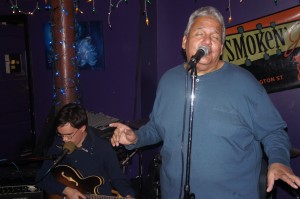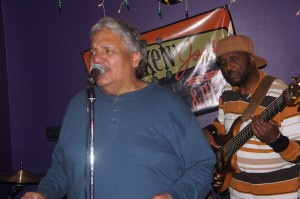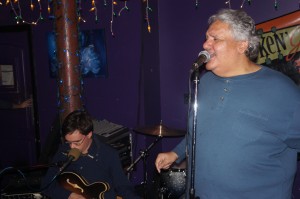 Jose Ramos has been fronting his No Way Jose Band for ten years now. He’s the band leader, the musical director, the booking agent, and the lead vocalist. Ramos goes over well at his regular haunts like Smoken’ Joe’s BBQ & Blues in Brighton, Glenn’s Cool Bar and The Grog in Newburyport, The C Note in Hull, and he recently began singing at Pete’s Bar & Grill in Quincy. Ramos has had an amazing career in Boston, surviving many challenges and come out of it a better, stronger, wiser person.
Jose Ramos has been fronting his No Way Jose Band for ten years now. He’s the band leader, the musical director, the booking agent, and the lead vocalist. Ramos goes over well at his regular haunts like Smoken’ Joe’s BBQ & Blues in Brighton, Glenn’s Cool Bar and The Grog in Newburyport, The C Note in Hull, and he recently began singing at Pete’s Bar & Grill in Quincy. Ramos has had an amazing career in Boston, surviving many challenges and come out of it a better, stronger, wiser person.
Ramos started out with the Special Blend Band in 1985 with whom he became a regular at Wally’s on Massachusetts Avenue. The Wally’s gig lasted for 20 years and it made Ramos a Mass Ave fixture for most of his Boston singing career.
Wally’s became exclusive with the Special Blend. “I needed something with a little more flair to get recognition for the band,” he said. “I even used the Insane Asylum, that’s another band that I put work out with. But we do more of the jazz blues stuff. Insane Asylum might show up at the Birch Street Bistro in Roslindale on their blues and R&B nights.”
Ramos also works as a promoter for other bands that come into town. He has put backing bands together for people like William Bell and Eddie Floyd and he’s hoping to put a show together soon for the original Blue Notes.
Ramos’s first paying gig was in 1974 opening for Kool And The Gang at the Commonwealth Armory, with his band The Soul Possession. It was a three vocalist band that won some talent competitions in the Boston area. Shortly afterward, Ramos went to work for Maurice Starr.
“I was actually the guy behind the console running wires for him,” Ramos said. “If you remember the old recording system. It isn’t like it is now. Then it was somebody plugging in from one-A to five-B for different effects and what not.”
Ramos was born in New York City but moved to Boston as a four year old child. He attended Cathedral Grammar School where he sang in the church choir. That was his first real training. “They worked us every day,” he said. “That was back in the day when I was singing the falsetto tenor.”
 In his mid teens, Ramos, with his high pretty voice and his long hair reaching his shoulders, decided to put a group together. When his band opened for Kool And The Gang, they spent more money on clothes than what they got paid because they wanted to look for that gig.
In his mid teens, Ramos, with his high pretty voice and his long hair reaching his shoulders, decided to put a group together. When his band opened for Kool And The Gang, they spent more money on clothes than what they got paid because they wanted to look for that gig.
But before that, it was never easy breaking into the Boston music scene. Ramos and his band mates were a little too young to be in some of those drinking establishments. Yet, Ramos had a look that helped him get around that. He was a big kid, with very long hair, and a he had had a beard since he was in the eighth grade.
“I was able to manipulate that to psyche my way into different places,” he said. “I used to hang out at the old Sugar Shack in downtown Boston. That’s where I saw all the old R&B groups. You name it, they were there. I saw Smokey Robinson there. I saw The Temptations. We saw Harold Melvin And The Blue Notes with Teddy Pendergrass. You’d even see people like the Funkadelic in there and Parliament. I got a real education down there just watching them with their style of clothes they were wearing and their movements and arrangements.”
Ramos also used to sneak into the Boston Tea Party where he saw bands like Three Dog Night, Chicago, and Jefferson Airplane and Sly And The Family Stone. “They were doing ’Wanna Take You Higher” and he was so high, he passed out on top of the keyboards. As they were into ’Everybody Is A Star’ all of a sudden he came out of the nod and started singing ’Wanna Take You Higher,’ which was hilarious.”
Around that time, Maurice Starr started trying to push Ramos out into the scene. Starr was recruiting in Boston for his Hollywood talent search, having found a lot of his bands in Boston There was a show business element to working for Starr. “They introduced me as Jose La Bamba, and I would sing ’La Bamba.’”
Working in the studio with Maurice Starr insured Ramos would be singing harmony parts for big name stars. Ramos, Starr, and a few others ended up singing the lower harmonies for “Candy Girl” and “Is This The End?” as released by New Edition. “He put the kids up on top of me,” Ramos said, “so we could get a more powerful harmony underneath the guys.”
 Ramos has been singing R&B, blues, and oldies rock and roll since 1989. Ramos, at that time, recorded and released a song called “Chimes.” He had the opportunity to tour on it in Italy, where he was performing pop material with his group, The Black Sun Band. Traveling from venue to venue, they’d slip in some of the old classic American songs, and they witnessed how much their foreign hosts enjoyed that music. Within the last two months before coming back to Boston, they were mostly performing that genre.
Ramos has been singing R&B, blues, and oldies rock and roll since 1989. Ramos, at that time, recorded and released a song called “Chimes.” He had the opportunity to tour on it in Italy, where he was performing pop material with his group, The Black Sun Band. Traveling from venue to venue, they’d slip in some of the old classic American songs, and they witnessed how much their foreign hosts enjoyed that music. Within the last two months before coming back to Boston, they were mostly performing that genre.
“We were traveling around through Italy playing for what they call their unity festival,” Ramos said. “They were neighborhood festivals, and every week they would go from city to city to city, and we were playing all of this old classic stuff, and they were eating it up. When I came back to Boston, I figured out this is what I should be doing. I knew this stuff as a kid. I grew up in Cathedral Projects. Although I came from an Hispanic-Puerto Rican family and our thing was more Tito Puente and those kinds of things. I was the only Hispanic kid within my own particular age group, and we were all listening to all of that old classic stuff. “
Sneaking around the corner from his family‘s apartment building. Ramos and his friends were were tuning into then Boston music radio stations like WRKO and WMEX for their fix. WILD soon came out of nowhere and began playing what they then called “Urban Music” which included The Temptations and Muscle Shoals. “I just sort of naturally took to it,” Ramos said.
Having grown up with Latino records playing in the house, Ramos still maintains interest as a fan, and he occasionally plays with his band some Cha Cha Cha and Meringue material. “At Birch Street Bistro, they do have a pretty decent Hispanic group of people that come out,” Ramos said,” so I’ll take a song and switch it up and put Hispanic rhythms to it.”
Being a Hispanic youth working with blacks and whites, Ramos had issues with discrimination and prejudice. “As a kid, I had a very mixed crowd of friends,” he began. “I wasn’t hanging out with just white guys or just Hispanic guys or just black guys. We were all pretty much hanging out and playing together. We were also doing a lot of sports stuff together. So I could be hanging out with one of my white friends, and we had to go by the house and they’d look at me and say ‘What the hell did you bring that n-word up in our house for,” Ramos recounted. Ramos’s friend would explain to his parents that ‘he’s not black, he’s Puerto Rican.’ Then somebody would go ‘What the hell is a Puerto Rican?’
Ramos hung out with some black kids who had parents that were just coming out of the1960s when things were not as easy for people of color. “Why’d you bring that white boy in our house?” Then, his friends would explain to their parents ‘No, he’s not a white boy. He’s Puerto Rican.’ And again, Ramos would hear the parents ask ‘What in the hell is a Puerto Rican?”
Even when he went into the home of a Puerto Rican friend, they’d take one look at him and ask ‘Why did you bring that American kid in here?’
“So I got it on all three ends,” Ramos said. “But that made me a better person, and I’m glad it did because the experience of that makes you stronger.” The singer’s nationality, though, never worked against when he as little bit older and went into the music scene. Boston has always had singers of different races and nationalities.
Ramos still brings his Latin influences into his shows. He recently starting singing George Benson’s “On Broadway” with a Cha Cha Cha theme. “It works out really nice because people know the song and they like it, and they also like the fact that it’s danceable,” he said. Ramos sings the Freddie Fender song “Before The Next Teardrop Falls” half in Spanish and half in English “It’s got that country and western feel. People really eat that song up.” he added.
Ramos’s biggest obstacles came in the form of some of the people who worked in the business end. He said they were horrible experiences based on greed. That’s right. He’s was talking about booking agents. “They’d get a gig for 2,500 bucks, and tell me that it was for a thousand dollars ‘and don’t forget I want my 20 percent from that.’ It had happened several times. A few times I had to threaten to go down to Ash Burton Place and take out a claim against their license. Come to find out, some of these people don’t even have booking licenses. Some of these people were just ridiculous. They were just greedy and taking advantage, thinking that you’re an idiot.”
Over the years, Ramos developed name recognition and respect. He could eventually have more control over what he wanted to do and how he wanted things done. “It’s one of the blessing I had from coming out of it,” he said.
Ramos’s biggest disappointment in his career came after performing with Beantown Jazz Festival three years straight. The event was taken over by Berklee College Of Music. After the event became the Berklee Jazz Festival, Ramos was dropped from the roster and never even contacted again.
“That really took me back,” he said. “Over all of those years being at Wally’s, I worked with a lot of Berklee students. I thought that after 20 years being at Wally’s working with all of the Berklee students that Berklee would have given me a little more credit and notice and respect, and they absolutely shut me out. I feel like Rodney.”
But, by then, Ramos was getting a lot of press in the Hub. Boston Globe music journalist Steve Morse was mentioning him three to four times a year, especially when the Boston Globe Jazz Festival was coming up, calling Ramos, during his 14 years in the show, “a local underground Boston icon.” Ramos said he still credits for helping him people like Morse and DJ’s Holly Harris, Jim Carty, Peter Black, and the late Mai Cramer. They were playing Ramos’s 12 inch disc “Times Two” in 1980 and then in 1981 Ramos released a six song E.P. that did very well. Seven years ago, Ramos released a full length album Just Call Me Zay, produced by Scott Matalon who now owns Stingray Body Art in Allston. The Zay album also sold well. “He and I are still great friends, and I’m trying to see if I can nail him down to do the next CD,” Ramos said.
Ramos continues to hear positive responses to his past recordings. “That recording ‘Chimes,’ there’s a guy in Germany who has a used copy of it, and it’s only a 12 inch disc with had a long version on one side and a radio edit on the other side and he was selling it for 75 bucks,” Ramos reported. “I was really happy to see that. I’ve got three boxes of brand spanking new discs that I’m waiting for him to sell so I can put one out at a time to see if I can get some play on it.”
Ramos speaks three languages and he works as a translator for many public services through Catholic Charities, whom he contracts through. Child Support Court, medical, Department Of Revenue, Department Of Welfare, Unemployment Assistance, the elderly, Children of Family are just some of the areas he works in to help people to understand each other. Ramos also works for the Volunteer Lawyer’s Project.
Ramos got involved with this work through his mother who had worked for South End Community Health Center. The singer, who had been working as a salesman for a car dealership, was getting tired of making money for the people on top of the pyramid. The director of his mother’s agency suggested he get involved with interpreter work. Ramos got to take classes that were already paid for at a time when the agency didn’t have anybody to take them.
“The classes were set up through UMass, and it was through the Medical Interpreter’s Association. We were doing the classes right up here at Forest Hills,” Ramos said.
When the profession reached a point when it required a college degree, Ramos was able to continue, as the older, more experienced works were grandfathered in. He still must take refresher classes. “When I first did it, it was a six and a half month program, and we were doing Wednesday nights and every Saturday,” he said. “Wednesday night was a four hour thing, and Saturdays was an eighty hour thing.” Ramos ended up doing better in the class than medical staffers.
Ramos would like to get onto some tours and go from making neighborhood money into more. “Even if it’s a regional thing, I can get out and just make sure I’m not forgotten,” the singer said. “It doesn’t matter what it is, just as long as I can get out there and get around to be heard and be seen and make some money.”